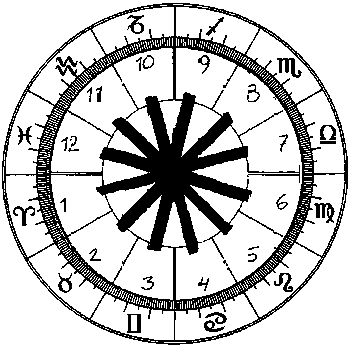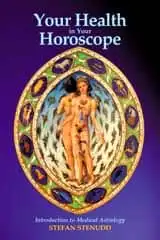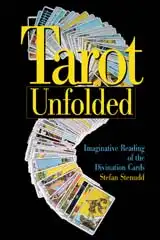|
by Stefan Stenudd
|
Opposition Aspects in the Complete HoroscopeIrreconcilable Inner Forces in Classical Astrology The opposites who cannot meet, going one way or the other, never to conjoin or cooperate.
The classical astrology meaning of an opposition is that the powers involved are separated and opposed, so that at a given moment either one or the other is at work — rarely both. The relation can be described as one of "either or". The closer the opposition is to 180°, the more this separation is true. Because two powers oppose like this, the result is a heightened force for both of them in the horoscope. In some cases, there can be three or more points in an opposition, if one or both sides of it has a conjunction. Of course, such an opposition is even more important.
OriginThe origin of the astrological significance of the opposition is no mystery: When two planets in the sky are exactly opposite one another, with the Earth in between, they are as separated as possible. Also, there is math in the aspect: the circle's 360° divided by two is 180. And in the Zodiac, the signs that are opposite one another are indeed as different as can be — they share quality (cardinal, fixed, or mutable) but not element, which means that they tend in opposite directions with the same persistence.

KeywordsThere is no room here to describe all the possible oppositions and how they should be interpreted. Instead, see the keywords for the planets below, and you will probably figure out what their oppositions will signify. Also take into consideration the Zodiac sign each planet is in, which tells you more about the nature of that planet's influence — and even more so the Houses of the opposing planets, which inform you of where in your life the opposition is mainly active. Here are the keywords for the planets and other points that form aspects:
For example, the moon in opposition to Mercury means that your longing and your curiosity are separated: when you are involved in one, the other is neglected. You are rarely, if ever, able to combine the two at one moment in time. The House of the moon will tell you what you long for the most, and the House of Mercury will tell you what you are the most curious about. Here are the twelve Houses, and keywords for what part of life they describe:
2nd House Resources 3rd House Communication 4th House Home 5th House Pastime 6th House Work 7th House Partners 8th House Unknown 9th House Travel 10th House Career 11th House Ideals 12th House Shortcomings
Also the twelve signs of the Zodiac have natural oppositions, as mentioned and seen on the illustration above. Observe that the Ascendant and Medium Coeli cannot form an exact opposition, and it is very unlikely that they even come close — except for latitudes close to the poles of the Earth. Mercury and Venus never form an opposition, since they are never more than 76° apart.
Native oppositionsOppositions in a birth chart never change. They show characteristics that you are born with and will keep all through your life. Pay attention to what Houses they are in. That shows in what area of your life the oppositions mostly express themselves.Also, consider how long the opposition lasted in the sky, at the time of your birth: Some come and go very quickly, so they are quite personal, whereas others (those of the outer planets) remain for years, so they are shared by a whole generation.
Transit oppositionsTransit oppositions are those formed by the planets up in the sky to the points in your complete horoscope chart. Like the conjunction, it happens only once in each planet's orbit around the sun. For example, every year the sun returns to the spot opposite the one it had when you were born — half a year from your birthday. For the moon, this is done in just a month. Of course, they form oppositions with all the other planets of the horoscope along the way. The slowest planet Pluto takes 248 years to complete its orbit, so many of its opposition will not take place in a lifetime.Here are the times it takes for the planets and other points to make one rotation around the Zodiac, in round numbers — from a geocentric perspective, ie. as seen from the earth.
The frequency of a transit opposition decides how important it is in your life. So, Pluto causes big and lasting changes, whereas the moon does little more than influence your mood at the moment.
ProgressionsProgressions are aspects formed by imaginary movement of the planets and other points in the birth chart. They don't correspond to any actual movement of the planets. Therefore, they should be used with care. But many astrologers regularly consider progressions, so you may want to try it. I rarely do it, which is why I don't present it further here. Transits make much more sense to me.
OrbOrb is the measure of what angle is to be regarded as an aspect. For transit aspects of any kind, I would not recommend an orb grater than 1°, so that a transit opposition commences when the transit planet is 179° from the position of the natal planet, and ends when the transit planet has passed and they are again less than 179° apart — on the other side of the horoscope. That usually takes more than a year for Pluto, but no more than about four hours for the moon.Be aware that some transit aspects return once or twice, because of the retrograde movements of the planets, as seen from the Earth. So, usually a transit passing is followed by a retrograde passing, and then finished with a third passing when the planet resumes its forward movement. That means the event triggered by the transit tends to announce itself, then seem not to happen, but then finish by happening pretty much as it was originally announced. That's how much in life works, because of this stellar rhythm. In the case of aspects in your complete native horoscope chart, orbs vary according to aspects. For the opposition I recommend an orb of no more than 5°, but there are astrologers that use as much as 10°. You can also allow the orb to vary according to what planets are involved, but that should be done moderately.
The AspectsHere are the major aspects in astrology, with links to the webpage of each:
MenuCOMPLETE HOROSCOPEHow to Make Your Own HoroscopeYour Health HoroscopeSex in Your HoroscopeZodiac ArchetypesFinancial AstrologyDaily Horoscope Guide — What to ExpectTetrabiblos — the Ancient Astrology BibleHOROSCOPE BASICSZodiac — the "how" of the horoscopePlanets — the "what" of the horoscopeHouses — the "where" of the horoscopeAspects — the "why" of the horoscopeFAMOUS HOROSCOPESDonald Trump — 2025 inauguration horoscope2024 presidential election horoscope for Kamala Harris2024 presidential election horoscopes for Donald Trump and Joe BidenJoe Biden's 2020 presidential election horoscopePete Buttigieg's 2020 presidential election horoscopeDonald Trump — impeachment horoscopeDonald Trump — will he resign?Hillary ClintonMike PenceBarack ObamaAnders Behring BreivikMichael JacksonSarah PalinBrad PittThe USA Horoscope — Finding and Reading ItPREDICTIONSThe USA Pluto return 2022 horoscopeCapitol attack horoscopeCovid-19 coronavirus horoscopeFuture of the InternetThe Age of AquariusUSA 2016 ElectionMundane Pluto — Its Effect on SocietyMundane Neptune — Its Effect on the ArtsMISCAbout the Complete Horoscope WebsiteDisappearing Ascendant — Latitude EffectsThe Envelope Chart — Horoscope of the PastAstrology LinksAstrologi på svenskaContactCookiesZODIAC SIGNSThe twelve Zodiac signs and what they mean in astrology.
MY OTHER WEBSITES
Tarot Card Meanings
I Ching Online
Stefan Stenudd
About meI'm a Swedish astrologer, author and historian of ideas, researching ancient thought and mythology. My personal website: stenudd.com
|
|||||||||||




